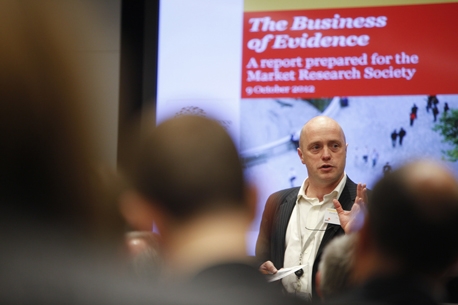FEATURE10 October 2012
All MRS websites use cookies to help us improve our services. Any data collected is anonymised. If you continue using this site without accepting cookies you may experience some performance issues. Read about our cookies here.
FEATURE10 October 2012
The contribution that research makes to the UK economy is significant. But even the £3bn figure published yesterday doesn’t account for the wider impact of the industry.

£3bn – that’s the gross value added generated by the market research industry for the UK economy, according to a report published yesterday by PricewaterhouseCoopers (PwC) on behalf of the Market Research Society (MRS).
“MRS chief executive Jane Frost said that the report provides an impressive number with which to approach government and make the case for research being recognised as an industry in its own right rather than being lumped in with marketing et al.”
It’s a big number but, based on what was discussed at the report’s launch last night, it could be bigger still.
According to David Armstrong (pictured above), a PwC partner, preparing the report was an exercise in trying to “recalibrate what we mean by ‘research’.”
“If you look at the traditional providers of research and the figures provided by MRS you get an employment figure somewhere just short of 40,000 FTEs,” said Armstrong – leading to a GVA of £1.8bn (PwC notes that for the purposes of this report, GVA mainly comprises employee earnings and profits generated).
But in seeking to ‘redefine’ research, PwC looked at who else was engaged in what has been described as “the business of evidence”? Added to the mix were clientside researchers in other private sector organisations, people working in higher education institutions, data analytics roles, central and local government, think tanks and charities. That brings the total number of FTEs to almost 59,000 and a GVA of £3bn.
Yet it seems that even this figure might not fully reflect the size of the evidence business and the scale of its contribution to the UK economy. One attendee said he had compiled a list of 614 big data start-ups seeking angel investment – none of which were featured in the final tally, said Armstrong.
Another raised a question about the wider impact of research, namely the revenues and profits generated by companies thanks to the research work done to support the launch of new products and services. Again, this had not been factored in – but given the long-running and so far unresolved debate about how to work out the ROI of market research, it’s not surprising that the wider impact calculation was left off the table this time around.
MRS chief executive Jane Frost made no claims to this being the definitive report on the size and scope of the ‘evidence’ business. What it is, she said, is a first step – an impressive number with which to approach government and make the case for research being recognised as an industry in its own right rather than being lumped in with marketing et al.
“We have here an industry that is bigger than many of the things people get excited about” – like the music and radio industries – “and about a third of it is export, which makes it a major benefit to the UK.”

Dunnhumby founder Clive Humby – a newly-named patron of the MRS – spoke at the launch to hail Britain as “a world leader in research”, while social commentator, management consultant and newspaper columnist Peter York (above) – another new patron – described market research as “a very broad and brilliant church”, one that has generated “a very impressive intelligentsia”.
Persuading people of that remains a challenge, said York. The hope is that ‘The Business of Evidence’ report will help make the case.
0 Comments